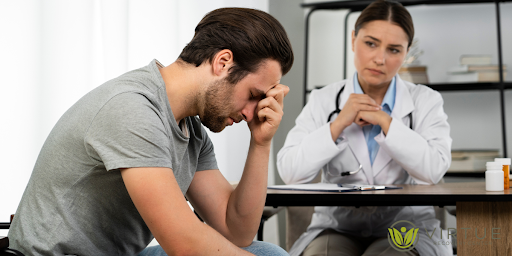Key Takeaways:
- Students who abuse MDMA and have unresolved trauma may have serious mental and physical health problems.
- Trauma-informed care is very important for people who are recovering from addiction, especially young people.
- A Partial Hospitalization Program gives you structured, evidence-based treatment without having to stay in a hospital full-time.
- Combining treatments such as the Trauma Therapy Program, the Relapse Prevention Therapy Program, and medical detoxification can significantly improve results.
- A drug addiction center can make personalized treatment plans that deal with both trauma and drug use.
Introduction
A drug addiction center is very important for helping young people deal with the complicated link between past trauma and drug abuse. MDMA, which is often called “Molly” or “Ecstasy,” is one of the many drugs that students abuse. It has become more popular because it is known as a “party drug.” Sadly, a lot of students don’t know how bad MDMA can be for the brain, especially for people who have already been through emotional or mental trauma. MDMA is a drug that students with unresolved trauma often use to feel good and connect with others. It can temporarily hide feelings of anxiety, depression, and loneliness. But using it over and over again makes these problems worse and makes it more likely that you will become addicted in the long run. To help these students who are abusing MDMA, we need a full treatment plan that deals with both their trauma and their addiction at the same time.How Does Trauma Affect Young People’s Addiction To MDMA?
Students who were abused or neglected as children or who have had a lot of stress in their lives are more likely to try drugs that affect the mind. MDMA can help with emotional pain in the short term because it floods the brain with serotonin. But this relief is not real. Using MDMA, as per the National Library of Medicine, can lower the levels of serotonin in the body, which can make people more likely to get depressed, anxious, and have long-term mental health problems. A lot of addiction experts suggest that people who are addicted to drugs go to a center that offers integrated care, which includes both addiction treatment and mental health support for people who have been through trauma.
What Are The Best Treatment Plans For Students Struggling With MDMA Abuse And Trauma?
A multifaceted approach is very important. Programs must be based on evidence and take trauma into account. They usually start with medical detox and then move on to structured therapies. A Partial Hospitalization Program (PHP) is a great option for students. It provides intensive treatment during the day and allows people to return to a supportive environment at night. Individual counseling, group therapy, and medication management are all common parts of PHPs. These programs often use cognitive-behavioral therapy (CBT) and mindfulness-based techniques for students who have been through trauma.What Supportive Therapies Are Most Effective For MDMA Addiction Recovery?
When adapted for students who have been through trauma, several therapies have worked well. The Trauma Therapy Program at Virtue Recovery is one of the best because it helps people figure out and deal with the traumatic events that may have led to their drug use. Without this step, students may keep taking drugs to feel better even after detox. A structured Drug Detox Program is just as important as trauma-specific therapy. When you detox from MDMA, you may have to deal with mood swings, trouble sleeping, and problems with thinking.What Are The Long-Term Effects Of MDMA Abuse On Students Who Have Been Through Trauma?
Using MDMA over and over again can have a big effect on how well you think, how well you control your emotions, and how well you act socially. People who use drugs for a long time may have trouble remembering things, paying attention, and feeling stable emotionally. People who have unresolved trauma have worse versions of these symptoms because the drug often makes mental health problems worse. Parents, teachers, and doctors need to be able to spot the early signs of MDMA abuse, like feeling alone more, acting strangely, or being emotionally numb. Receiving help promptly from a reputable drug addiction center can make a significant difference. Students who get full treatment for both trauma and drug use are more likely to stay sober for a long time. To raise awareness and stop people from trying MDMA (Molly) for the first time, educational efforts should also answer the question, What Are The Common Side Effects of MDMA (Molly) Use?Why Is Early Intervention Critical In Treating MDMA Addiction In Students?
Early intervention helps treatment work better by getting to the psychological causes of addiction before they become deeply ingrained. Early treatment can help students do better in school, get along better with their families, and stop the onset of co-occurring disorders. The Substance Abuse and Mental Health Services Administration also talks about how important trauma-informed care is for lowering drug use. Students are not just dealing with an addiction; they are also dealing with deep emotional wounds. A caring, personalized approach can turn weakness into strength and stop someone from using drugs for the rest of their life.How Can Treating MDMA Abuse Help Prevent Crashes in Raves Among Students With Past Trauma?
Addressing MDMA abuse through effective mdma crash treatment options plays a crucial role in preventing dangerous situations at raves, especially for students with past trauma. By providing support and guidance, these treatment options help mitigate the negative effects, allowing individuals to safely enjoy the experience while fostering a healthier party culture.









